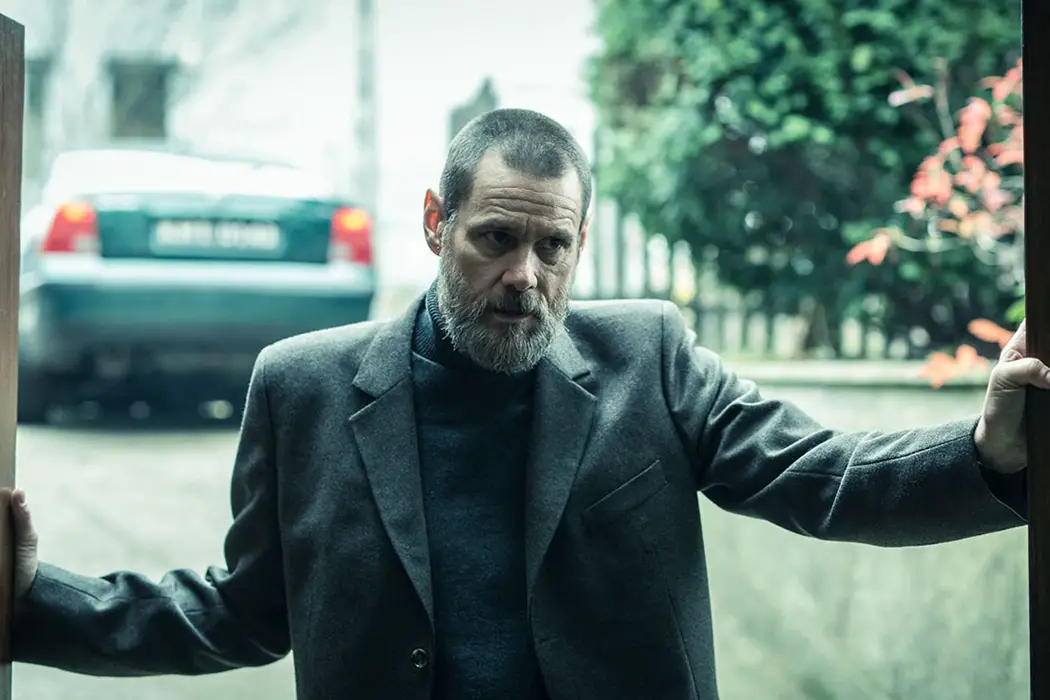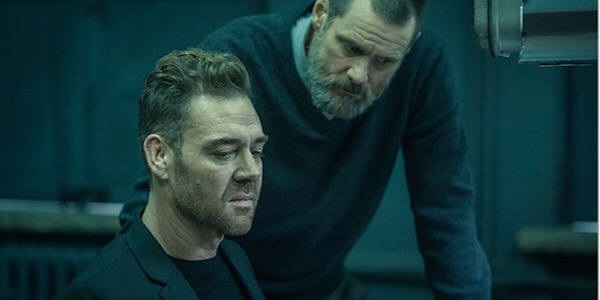DARK CRIMES: This Murder Mystery Falls Flat

Kristy Strouse is the Owner/Editor in Chief of Film Inquiry,…
At the beginning of Dark Crimes (originally called True Crimes), newest from director Alexandros Avranas, there are some quick shots of naked women, blindfolded and degraded, trapped amid the darkness. These opening images, paired with the credits, invite a much more sinister tale than what is actually delivered.
A blunt beginning, laying the ground for a twisted tone, has you wondering… what’s going to happen next?
That first delve into the perverse is touched on a few times throughout the film, but not to the same degree. In the last half hour, the sleeping giant awakes, but not enough to save this thriller from itself. While I’m always game for Carrey playing an intense and bold character, Dark Crimes doesn’t quite suffice.
A Basic Crime Thriller
Jim Carrey plays Tadek, a polish cop soon to be retired, confined to a desk, who decides to give a cold case he just can’t seem to let go of another shot. If he can solve it, he’ll get his old job back. Why – if he’s going to be retiring in a year? Pride and obsession come to mind, but it’s never really stated.
A young businessman was murdered, but his killer never caught. He frequented a place named The Cage, a bondage sex club. As did Koslow (Marton Csokas), a famous crime writer. The connection between these two gets Tadek’s brain whirring. He goes on to listen to one of Koslow’s audiobooks, hanging on each word, searching for evidence. When certain descriptions match the details of the murder that hadn’t been released, he believes he’s found his killer.

His imbalanced home life is mechanical, his child a set piece and his wife overlooked. It’s clear he’s married to his work, and this particular case is the one who got away. He’s not interested in retiring unfulfilled and incomplete. His discontented wife Marta (Agata Kulesza) encourages him not to forget who he is, but it seems that’s exactly what he’s willing to do. As the story continues, a wedge is further driven between Tadek and his wife as he refuses to give it up.
As his frustration mounts, he exercises a bit through aggressive sex with Kasia (Charlotte Gainsbourg), a drug-addict single mother who is also Koslow’s on/off again girlfriend. Most of Dark Crimes is a war between these two leads, as Tadek tries to solve the case. Though referenced as the “last honest cop,” the methods he takes to achieve this aren’t always legal. His fixation distracts him from seeing the truth, sometimes with evidence staring him right in the face. Along with Koslow, he’s insistent on bringing down his corrupt head of police Greger (Robert Wieckiewicz).
Underwhelming and Unsatisfying
Carrey is passionate in his pursuit, especially as the story unfolds. To begin, his demeanor matches just what you’d expect. On paper the retiring, grumpy cop isn’t exactly innovative. Luckily, he shakes free of the shortcomings of his character, and as things unravel his frustration bubbles to the surface, giving him more room to stretch out. Despite any limitations, it’s good to see Carrey being adventurous, and hopefully this sets the pace for some future castings.
In the scenes that work, the score by Richard Patrick and Tobias Enhus helps to elevate the material. Though, at times, especially when paired with the frequent close-up shots, it feels a bit overwhelming.

One of the best scenes in the film is between Carrey and Csokas when he first brings him in for questioning. Koslow is sarcastic and arrogant, which should unbalance Tadek, but they both keep their wits. Another dynamic scene is with Gainsbourg, in a revelatory monologue delivered at the end of the film. If only that same veracity could have been matched for the remainder of the movie. While the cast works in its entirety, Gainsbourg has one of the more emotive and convincing performances in the film.
The film is understandably dark in context, but it is also in palette, making it a dreary experience. The story is based on The New Yorker article ‘True Crime, A Postmodern Murder Mystery’ by David Grann about a real-life crime, and screenwriter Jeremy Brock adds some fillers in an attempt to make it more interesting. Unfortunately, this isn’t the result. Director Alexandros Avranas has a concept of value, but the execution fails.
Conclusion: Dark Crimes
Overall, the movie never really gets an opportunity to envelop you; it loses steam quickly. There are some pacing issues too, especially in the beginning, and paired with the choppy editing, it makes for a slow ride.
The film has a very masculine hand, with only Gainsbourg as a significant female anchor. While she’s strong, the other supporting roles are underused. There isn’t much room for thrills or surprises, which -in this kind of film – are necessary components. The final sequence of the film provides a jump start, but it’s too late to bring it back to life. Dark Crimes is a dreary sort of movie, that lulls you when it should provoke.
What did you think? Did the film intrigue you? Have you read the original article? Let us know in the comments below!
Dark Crimes will be released on direcTV on April 19th and be released in theaters/demand in the US on May 11th. For more information on international releases click here.
Does content like this matter to you?
Become a Member and support film journalism. Unlock access to all of Film Inquiry`s great articles. Join a community of like-minded readers who are passionate about cinema - get access to our private members Network, give back to independent filmmakers, and more.
Kristy Strouse is the Owner/Editor in Chief of Film Inquiry, writer, podcaster, and all around film and TV fanatic. She's also VP of Genomic Operations at Katch Data and is a member of The Online Association of Female Film Critics and The Hollywood Creative Alliance. She also has a horror website: Wonderfully Weird & Horrifying.













